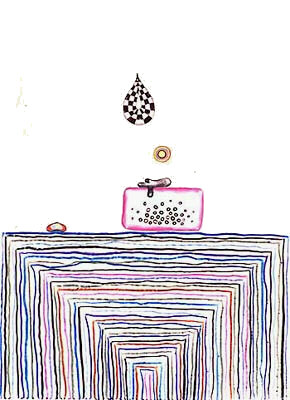 I honor my parents for providing me with the wings to take the journey to Israel, many years ago, not knowing that the experience would change me irrevocably. I moved to New York City after college, and though I valiantly continued to try for several years to fit myself back into the narrow world of the church, I finally accepted that I had expanded so much that I could not wedge myself into its parameters.
I honor my parents for providing me with the wings to take the journey to Israel, many years ago, not knowing that the experience would change me irrevocably. I moved to New York City after college, and though I valiantly continued to try for several years to fit myself back into the narrow world of the church, I finally accepted that I had expanded so much that I could not wedge myself into its parameters.
Eventually, I converted to Judaism, taking Ruth – my middle name - as my Hebrew name. The rabbis who converted me were most concerned about whether I would keep a kosher home and raise my children Jewish. We never discussed God, nor did they ask me if I was okay with giving up Jesus. Perhaps they thought it was a sensitive subject. Maybe they felt that Jesus was a dirty secret in the Jewish closet and did not want to acknowledge him at all. In any case, they seemed to have no clue what was potentially at stake for me in converting to Judaism: my eternal life and that of my children.
Some things changed, and others didn't. I once celebrated the spring season recalling Jesus’ death, a sacrifice that hearkened back to Abraham’s willingness to sacrifice his son. As a Jew, I now appreciate spring as a time of new beginnings, of freedom from the bondage of slavery, of crossing over from Egypt into Israel -- and seven weeks later, when we celebrate Shavuot and read the Scroll of Ruth, I am reminded of my own new beginnings as well.
The Passover Seder meal ends with opening the door and singing a song inviting Elijah, the precursor for the Messiah, to enter. Last year, a non-Jewish friend at our Seder table was profoundly moved at the hope that this ritual implied: leaving a door open and expecting a Messianic figure to enter. The book of Ruth likewise ends with a genealogical list leading up to King David. According to tradition, the Messiah will come from the House of David: the one who will redeem us, all of us, is a descendant both of the tribe of Judah as well as of the despised Moabites.
Other boundaries shifted as well. When Philip caught a glimpse of my breasts, my baby had only recently burst forth from the safety of my body, the boundaries between mother and child are still quite fuzzy. But slowly, as my son became more and more independent, the boundaries changed, expanded. As he grew, so did I, enjoying the freedom to be away from him for longer periods of time. Two years ago, my daughter chanted the entire book of Ruth for her bat mitzvah. My parents and seven of my nine siblings sat proudly in the synagogue, the men and women in their separate sections -- the irony of having exchanged one set of boundaries for another was not lost on me. Amongst our guests was that professor from Israel who, during that class many years ago, I had suspected of harboring a demon, because of his heretical views on the Bible. In truth, he had been instrumental in encouraging me to begin to flutter my new-found wings.
I no longer dream of the “eagles’ wings” that I once hoped would transport me from Indiana to Petra, in anticipation of Jesus’ return. Rather, I think of God’s wings, and of the wings that we all possess, which now have a dual meaning. On the one hand, the Divine wings shelter us and protect, as I liked to imagine all those years ago. On the other hand, they are available to us, in our personal flights to lech lecha beyond the boundaries that constrict or bind us. Wings of this latter sort can be frightening, asking us to stretch seemingly beyond our limitations. But the wings of Shaddai still shelter and nurture - even as they allow us to soar way, way out of bounds.

June, 2004
Making peace with Jesus
Douglas Rushkoff talks with Zeek about the future of Judaism
June, 2004
The Zeek interview
May, 2004
April, 2004
March, 2004
July, 2003
Constitutive ritual for distributed families
May, 2003
The soft borders between Jewish particularism and universalism
February, 2003



Neurotic Visionaries & Paranoid Jews
April 7, 2005
Jews on Stage
Dan Friedman
Out of Bounds
Angela Himsel
Masoretic Orgasm
Hayyim Obadyah
Messianic Troublemakers: Jewish Anarchism
Jesse Cohn
The Hasidim
Hila Ratzabi
Discipline
Jay Michaelson
Archive
Our 640 Back Pages
Zeek in Print
Spring 2005 issue now on sale!
About Zeek
Mailing List
Contact Us
Subscribe
Tech Support
Links
From previous issues:
Faces of Death
Thomas Vinciguerra
What the World is...
Jay Michaelson
Erev
Temima Fruchter
 Email us your comments
Email us your comments